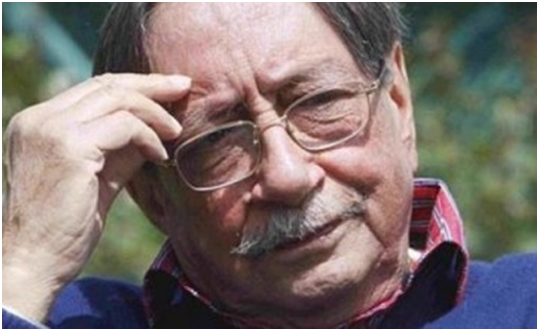Spy Masters 'Leaks' Stir Hornets Nest In Kashmir
AS Dulat: Back in the news

SRINAGAR: India’s retired spymaster, Amarjit Singh Dulat, has given enough ammunition to his detractors even before the book ‘Kashmir: The Vajpayee’s Years’, co-authored by him with journalist Aditya Sinha, is formally released on 8 July 2015.
In his book the former spy chief AS Dulat shares his experiences of working as chief of RA&W and Intelligence Bureau station head in Jammu and Kashmir.
The revelations made by the author are either being viewed with deep suspicion or accepted as the uncomfortable truth in Kashmir, depending upon which side of the ideological fence one belongs to.
On 2 July, Dulat said in an interview with India’s well-known television anchor, Karan Thapar, that Jammu and Kashmir’s former Chief Minister, Farooq Abdullah, wanted militants involved in the 1999 Kandahar hijack “neutralised in Amritsar only”, but his view was opposed by the ‘confused’ higher-ups who could not take any quick decisions.
In Dulat’s opinion the 1999 plane hijack was “goofed up”.
In his memoir, ‘Kashmir: The Vajpayee Years’, Dulat writes that the Indian government had very often paid for the airfares, medical treatment and general upkeep of Tehreek-e-Hurriyat chief, Syed Ali Geelani. He also named Yasin Malik.
JKLF leader Yasin Malik told The Citizen that he would give an appropriate reaction only after going through the book.
He, however, asserted that “any political prisoner was bound to receive medical treatment from those who imprison him/her.”
He was reacting to the allegation made by Dulat in an interview with Barkha Dutt of NDTV 24/7 in which the intelligence chief said that “Indian intelligence agencies have over the years, often paid militants and separatists, along with mainstream politicians and political parties in the Kashmir valley.”
Dulat continued, “So what’s wrong? What is there to be so shocked or scandalised by? It’s done the world over.”
International law expert and political commentator, Dr. Sheikh Showkat Hussain, said that “memoirs of retired army generals and spy chiefs are generally ‘excuses’ to justify whatever wrongs they commit whilst in service.”
Dr. Hussain, who teaches law at Central University of Kashmir, further said that a detailed response from him would come only after he reads the book, but his immediate reaction is that “desperation for post-retirement engagements makes people like AS Dulat write memoirs in which they cook up sensational stories and use the same as attention-seeking devices.”
On social media the unqualified rejection of Dulat’s claims from Kashmiris remains dominant. However, there are a handful of takers, too.
Dulat also said in a television interview that Hizb chief Salahuddin had called up Congress party leader Syed Mir Qasim, apparently with an aim to allow him a safe passage to Kashmir in the mid-1990s.
“Actually, it is a long old story. If my memory serves me right it goes back to the summer 0f 1995-96. I was in Srinagar. Syed Mir Qasim was politically very active. One day he told me that ‘of all the people Salahuddin called me up and said, Suna Hai Aap Baat Cheet Kar Wa Rahein Hain, Hamein Mat Bhooliye …,” Dulat told NDTV 24/7.
Dulat said that Farooq Abdullah facilitated the process, as he was “always very supportive in matters of national interest.” Dulat also writes that AB Vajpayee “reneged on his promise of making Farooq Abdullah as India’s Vice President”.
But spokesperson for Salahuddin, chief of Kashmir’s largest indigenous militant outfit Hizb, in a statement e-mailed to the media refuted all allegations made by Dulat.
Hizb’s Muzaffarabad based spokesperson, Saleem Hashmi, while quoting Salahuddin termed assertions of AS Dulat a “lie taller than Himalayas.”
“The remarks made are unfounded. There is a motive to create doubts in the minds of common people of Kashmir vis-à-vis the freedom struggle. Hizb supremo Salahuddin has never contacted any government official,” the statement said.
Dulat has argued in his book that “one of India’s most wanted militant Syed Salahuddin had been in touch with him and was ready to leave Pakistan and return to India.”
This, according to Dulat, was done with an intention to get Salahuddin back into the mainstream fold, which eventually did not happen.
Former R&AW chief also said that Jammu and Kashmir’s current Chief Minister, Mufti Mohammad Sayeed, was “in deep love with ‘Black Label Whisky’ and Mufti used to drink profusely whenever the two would meet.”
He also claimed that in 2002 AB Vajpayee had strongly been opposed to the idea of making Mufti Sayeed as Jammu and Kashmir’s Chief Minister, because New Delhi had serious apprehensions about Sayeed’s daughter that she might have close links with the Hizb and Jama’at-e-Islami.
“This is because Delhi at that time had grave doubts about Mehbooba Mufti. They believed she had links with the Hizb-ul-Mujahideen and Jama’at,” Dulat said.
Dulat further said that Mirwaiz Umar Farooq is one separatist leader who could be roped in, but he “is scared of his life.”
He himself has regretted not meeting Syed Ali Shah Geelani, voicing this to The Citizen on more than one occasion. Dulat says, though not in the book, that he would like to correct this and meet Geelani even now if possible.



